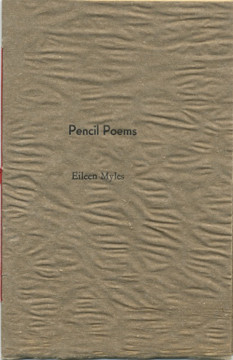Home from the sea
Memories of definitions of 'book'

Always books, there were always books in our multiple homes, growing up across one nation and across an ocean. I remember, in school, being so buried in a book, more than once, that I did not respond to teachers calling my name, but had to be physically jostled in order to be taken out of the book. Book then was an odd mix of physical and nonphysical space, room enough to get lost in. Think of the way a book is entered (and here I speak of physical books, with pages to be manipulated by hands, groups of pages bound together in what I suppose I should call a codex, though that word seems only to rarify what I grew up with as common daily object), a dance step in, beginning with an act of opening to space, only light and shadow on a two-page spread with nothing printed there, then a turn to a page-spread almost as blank, a half-title page, with only a title, sometimes only a part of a title. It's a doorway, a place to quit the world outside, shake it off, and prepare to come home ("Home is the hunter, home from the hill / And the sailor home from the sea") or at least to some other place. Another turn of the page and one encounters information, a confirmation of the title, a name or name of author or authors, most often a year that stamps the publication in time, and a publisher's name and sometimes place, and perhaps we should take a moment to exhale; for the first time, here we are, where this particular home begins to take shape, and gives us something of its created history. Not yet at the beginning of the main text of the book, which often can occur 9 or more pages after one opens the book. But we have negotiated the exit point (from outside the book) and entry point (to a place where we begin to conjecture the matter of the book). We have been eased in, and we are ready to be engaged, we who love to be astonished.
This place or home is not a refuge, for as we know, while it can comfort a reader, it can also crush her or him, make him cry, make her call out in anger; it can entirely satisfy one's reason to enter in the first place, and it can entirely frustrate any attempt to find such satisfaction. It can, if made with such intention, most often by an artist, engage as tactile substance, even a changing or developing tactile substance. It can require physical discomfort (think of a book whose pages are sleeves which one must move near and peer inside, reader's head becoming almost a part of the book's structure); it can ask for manual dexterity (multiple pop-ups, folding and unfolding pages).
In early days of being lost (or found?) in books, I had not yet encountered definitions and commandments, i.e. "A book shd be a ball of light in one's hand" (Ezra Pound, poet), or "A book is a multiple and sequential series of picture planes" (Walter Hamady, book artist), or "A book is a container and conveyor of information and ideas" (Joseph Traugott, curator). Then, as now, here's to the future.
A wing & a word